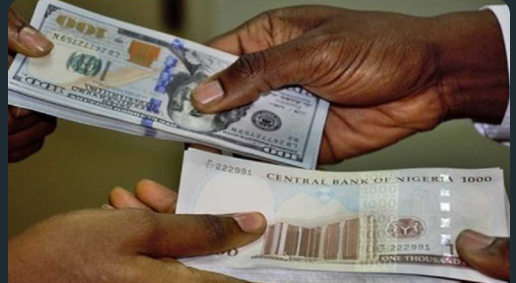Economy
Exchange rate appreciates by N63 to seven-month high

Nigeria’s exchange rate appreciated significantly in January 2025, gaining N63.72 against the dollar to close at N1,474.78 per dollar on January 31 at the Nigerian Foreign Exchange Market.
According to data from the FMDQ Securities Exchange Limited and the Central Bank of Nigeria, this increase of 4.14 per cent pushes the local currency to the highest level it has reached in seven months, with the last time the currency traded at a similar rate being June 11, 2024, when it stood at N1,473.88/$ in the official market.
The sharp increase has been attributed to policies implemented by the CBN, which have influenced market dynamics and contributed to the currency’s strengthening.
Authorised currency dealers quoted the dollar as high as N1,495.01/$ and as low as N1,447.50/$ at the NFEM.
The naira opened the year at N1,538.50/$ on January 2, 2025, and steadily gained value throughout the month.
By January 3, it had dipped slightly to N1,535.00 before fluctuating within a range that saw it hit N1,560/$ on January 16, marking its highest point for the month.
However, the currency embarked on a more sustained appreciation from the third week of January, closing at N1,531/$ on January 24 and further strengthening to N1,520/$ on January 28.
It continued its climb, settling at N1,506/$ on January 29 and N1,493/$ on January 30 before reaching N1,474.78/$ on the last trading day of the month of January.
The naira also appreciated against the US dollar in the parallel market on Friday, closing at N1,610/$, compared to N1,630/$ recorded on Thursday, representing a N20 increase within a day.
This latest movement reflects the impact of recent monetary and foreign exchange measures introduced by the CBN to stabilise the currency and improve market confidence.
The introduction of the Electronic Foreign Exchange Matching System in December 2024 has played a significant role in this development.
The platform, which operates through Bloomberg’s BMatch system, allows authorised dealers to place anonymous orders into a central limit order book, ensuring transparency and efficient price discovery in the foreign exchange market.
This system has helped reduce market distortions and provided the CBN with enhanced oversight capabilities, making it easier to manage fluctuations in the exchange rate.
Another crucial factor influencing the naira’s recent appreciation is the introduction of the Nigeria Foreign Exchange Code, launched on January 28, 2025.
“The FX Code marks a new era of compliance and accountability. It is not just a set of recommendations; this is an enforceable framework. Under CBN Act 2007 and BOFIA Act 2020, violations will be met with penalties and administrative actions,” CBN Governor Olayemi Cardoso said during the launch of the FX Code.
The FX Code establishes principles for ethical conduct, governance, execution, information sharing, risk management, and settlement processes among market participants.
By aligning Nigeria’s foreign exchange operations with global best practices, the initiative has strengthened investor confidence and contributed to the recent improvements in the currency’s performance.
At the end of 2024, the naira stood at N1,535.00 per dollar on December 31, reflecting the challenges that had persisted in the forex market.
However, the policy interventions introduced by the apex bank in early 2025 have helped stabilise the market, allowing the currency to make significant gains over the past month.
The improved transparency in the foreign exchange system has reduced speculative activities, ensuring that exchange rates better reflect actual market conditions.
However, while the local currency is improving, Nigeria’s foreign exchange reserves experienced a significant decline in January 2025, dropping by $1.11bn over the course of the month.
According to data from the CBN, the country’s reserves stood at $40.88bn on January 2, but by January 30, they had fallen to $39.77bn.
This represents a 2.72 per cent decrease within the one month.
The decline in reserves follows ongoing interventions by the CBN in the foreign exchange market, as well as external debt servicing obligations and capital outflows.
While the naira appreciated significantly within the same month, the reduction in reserves seems to suggest that the CBN may have deployed part of its FX stockpile to stabilise the local currency and manage liquidity in the official market.
At the start of January, reserves remained above the $40bn mark, recording $40.88bn on January 2 and fluctuating within that range for the first half of the month.
By January 10, reserves stood at $40.75bn, and they peaked at $40.96bn on January 6 before beginning a gradual decline.
By mid-month, reserves had dropped to $40.42bn on January 15, further sliding to $40.05bn by January 22.
The steepest declines occurred in the last week of January when reserves fell below $40bn for the first time in months, hitting $39.99bn on January 23 and $39.77bn by January 30.
With the FX reserves at a three-month low, the consistent drawdown indicates heightened FX demand and possible interventions by the monetary authorities to maintain exchange rate stability.
The current decline is similar to the significant drop recorded in April 2024, when reserves plunged by $2.16bn within 29 days.
At the time, Cardoso attributed the decline to debt servicing and other financial obligations rather than interventions to stabilise the naira.
Economy
Naira nosedives to N1,615/$ in parallel market

The naira depreciated to N1, 615 per dollar in the parallel market from N1,610 per dollar on Monday.
Likewise, the Naira depreciated to N1,602 per dollar in the Nigerian Foreign Exchange Market (NFEM).
Data published by the Central Bank of Nigeria, CBN, showed that the indicative exchange rate for the naira rose to N1,602 per dollar from N1,596 per dollar on Monday, indicating N6 depreciation for the naira.
Consequently, the margin between the parallel market and NFEM rate narrowed to N13 per dollar from N14 per dollar on Monday.
Economy
Stock Market Surges: N228bn Gain Sets the Tone for a Strong Trading to Week

The Nigerian stock market opened the week on a bullish note on Monday, gaining N228 billion on the Nigerian Exchange Ltd.
Market capitalisation rose by N228 billion or 0.34 per cent and closed at N66.693 trillion compared to Friday’s figure of N66.465 trillion.
Similarly, the All-Share Index (ASI) climbed by 363.57 points or 0.34 per cent, reaching 106,116.18 from 105,752.61 recorded earlier.
The Nigerian stock market opened the week on a bullish note on Monday, gaining N228 billion on the Nigerian Exchange Ltd.
Market capitalisation rose by N228 billion or 0.34 per cent and closed at N66.693 trillion compared to Friday’s figure of N66.465 trillion.
Similarly, the All-Share Index (ASI) climbed by 363.57 points or 0.34 per cent, reaching 106,116.18 from 105,752.61 recorded earlier.
The positive trend was driven by strong buying interest in medium and large-cap stocks including International Breweries, Legend Internet Plc, Cadbury Nigeria, Fidson and more.
In spite of the upward trend, the market breadth closed positively, with 47 gainers and 16 losers.
International Breweries led the gainers’ chart, rising by 10 per cent to close at N8.47 per share.
Legend Internet Plc followed, appreciating by 9.97 per cent to settle at N7.50 per share.
Cadbury Nigeria gained by 9.96 per cent, and end the day at N29.25, while Fidson rose by 9.95 per cent to close at N20.45 per share.
Eterna also advanced by 9.90 per cent to close at N43.85 per share.
On the losers’ chart, Livestock Feeds dropped by 10 per cent, closing at N8.55 per share.
Aradel Holdings declined by 9.86 per cent to end the session at N448.00 per share
Tripple Gee fell by 9.60 per cent to close at N1.79, while John Holt Plc shed 7.94 per cent to close at N5.80 per share.
Linkage Assurance lost by 6.15 per cent, and finished the day at N1.22 per share.
A total of 500.59 million shares worth N12.110 billion were traded in 17,637 transactions.
This is compared to Friday’s 428.08 million shares worth N20.174 billion, exchanged across 14,284 transactions.
Access Corporation led the activity chart with 60.867 million shares traded, which was worth N1.45 billion.
Fidelity Bank followed with 56.105 million shares valued at N1.13 billion while the United Bank for Africa sold 34.53 million shares worth N1.174 billion.
Guarantee Trust Holding Company transacted 33.49 million shares valued at N2.181 billion and the Nigerian Breweries traded 28.336 million shares, amounting to N1.15 billion.
Economy
OPay Scam Alerts advises Nigerians to remain vigilant against dubious activities

You are just seconds away from sending money – the offer sounds perfect, the seller seems trustworthy and the clock is ticking.
But just before you hit send, one of Nigeria’s leading financial institutions, OPay flashes a critical warning: “Caution – this account has been linked to suspicious activity.”
In that moment, the rush fades, your instincts kick in, and you realise you were on the brink of falling for a scam. One smart alert, one timely pause — and your hard-earned money stays exactly where it should: safe.
This is the power behind OPay’s multi-layered scam alert system — an Artificial Intelligence (AI)-driven, real-time defense network designed to detect and stop fraudulent transactions before they happen.
At the heart of it is a machine learning engine trained on thousands of scam patterns, user reports, flagged accounts, and unusual transaction behaviors. But OPay’s approach goes far beyond a single alert.
How OPay’s scam alert ecosystem works
Abnormal Transaction Pop-Up Reminders
When suspicious behavior is detected, OPay immediately interrupts the flow with a clear, targeted pop-up message. Every day, over 60,000 users receive these urgent fraud warnings — and thanks to that, 30,000 risky transactions are stopped in their tracks.
Intelligent Outbound Call Reminders
For higher-risk transactions, OPay activates a multi-channel response, sending warnings via SMS, email, app notifications, and even escalating to customer service calls. This proactive layer reaches more than 10,000 users daily, discouraging over 8,000 fraudulent transactions.
Interactive Q&A Verification
In cases where more context is needed, users are engaged with real-time Question & Answer (Q&A) prompts to understand the purpose of their transaction. If red flags are confirmed, the system presents a tailored warning or ends the transaction flow altogether. This feature alone helps deter over 46,000 scam attempts daily from the 50,000+ users who interact with it.
Together, these layers form a real-time scam detection and prevention engine that evolves with every user interaction. OPay’s system doesn’t just warn — it learns and adapts, constantly improving its accuracy and response time.
Many users don’t even know they’re in danger until OPay steps in. As one X user, @JAHS, shared: “OPay alerted me that I might be sending money to a scammer when I wanted to patronize an IG vendor. Stopped the transaction ASAP.”
These interventions are happening silently, daily – often before the user even suspects something is wrong.
OPay’s scam alert system is part of a broader philosophy: security is not just about technology – it’s about trust. From scam alerts to Face ID transaction verification, USSD instant account locking, the Large Transaction Shield, and automated callback alerts, every tool is designed to protect users in the moments they can’t predict.
As scams get more sophisticated, the future of financial safety depends on real-time prevention. And OPay isn’t waiting for fraud to happen — it’s stopping it in its tracks. Sometimes, the smartest financial decision you make… is the one OPay helped you avoid.
-

 Metro18 hours ago
Metro18 hours agoGunmen storm University of Benin teaching hospital, kill doctor
-

 Metro18 hours ago
Metro18 hours agoFCTA destroys 601 motorbikes over violations
-

 News9 hours ago
News9 hours agoAlleged money laundering: EFCC produces Aisha Achimugu in court
-

 News18 hours ago
News18 hours agoJust in: FG declares tomorrow public holiday
-

 News11 hours ago
News11 hours agoJUST IN: Major General Paul Ufuoma Omu Rtd, dies at 84
-

 News11 hours ago
News11 hours agoTinubu hails Dangote’s World Bank appointment
-

 News13 hours ago
News13 hours agoSAD! Professor’s son takes own life inside varsity staff quarters
-

 News18 hours ago
News18 hours agoFull list: FG approves N110bn to rehabilitate medical schools 18 institutions


















